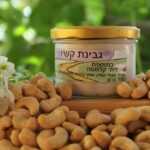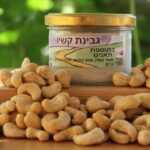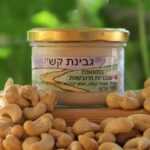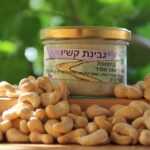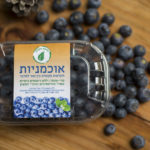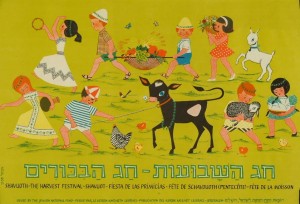Important Message – Delivery Schedule Change Next Week
Next week, immediately after Shavuot, Monday deliveries will be moved to Tuesday, June 7th. Wednesday deliveries as usual.
Chag Sameach
___________________________________
In honor of Shavuot
* Tal’s excellent cashew cheese is now on sale in five different flavors: natural, garlic and dill, figs, dried tomatoes and kalamata olives
30 NIS per 180 gr jar
—————————–
* Helkat Hasade’s excellent blueberries are now joined by red raspberries – an extraordinary new fruit for the holiday.
All these and other outstanding local products may be added to your box via our order system.
Chag Sameach!
_______________________________________
The whole of sky Shams al-Din Hafiz
Even after all this time the sun never says To the earth “you owe me. “ Look What happens With a love like that. It lights the Whole Sky.
How were the bikkurim taken up [to Jerusalem]? All [the inhabitants of] the cities of the maamad would assemble in the city of the maamad, and they would spend the night in the open street and they would not enter any of the houses. Early in the morning, the officer would say: “Let us arise and go up to Zion, into the house of the Lord our God.” (Jeremiah 31:5)
Those who lived near [Jerusalem] would bring fresh figs and grapes, while those who lived far away would bring dried figs and raisins. An ox would lead them, his horns bedecked with gold and with an olive-crown on its head. The flute would play before them until they would draw close to Jerusalem. When they drew close to Jerusalem they would send messengers in advance, and they would adorn their bikkurim. The governors and chiefs and treasurers [of the Temple] would go out to greet them, and according to the rank of the entrants, they would go forth. All the skilled artisans of Jerusalem would arise before them and greet them saying, “Our brothers, men of such-and-such a place, we welcome you in peace.”
The flute would play before them, until they reached the Temple Mount. When they reached the Temple Mount, even King Agrippas would take the basket and place it on his shoulder and walk as far as the Temple Court. When he got to the Temple Court, the Levites would sing the song: “I will extol You, O Lord, for You have raised me up, and You have not let my enemies rejoice over me.” (Psalms 30:2).
Mishnah Bikkurim 3 (2-4)
The holiday of Passover marked the beginning of the barley harvest. Seven weeks later, another festival of ripening and commencements has arrived – a time of wheat harvest and a celebration of new fruits (bikurim).
The Festival of the First Fruits (Chag HaBikkurim) received its name from the wave offering of two loaves (Shtei Halechem) that was brought to the Temple on that occasion. This constitutes the First Fruit offering from the first ripened wheat, and this day inaugurated the season when farmers would bring the first fruits of their yield to the Temple. The period continued till Hanukkah, the holiday that marks the close of the fruit season. Of course, fruit ripened at different times, not all on Shavuoth. Those that ripened earlier were dried or sold, and the money received was taken to Jerusalem to buy an alternative for the offering. Some fruits ripen later and their time will come, but from the Festival of the First Fruits, the cue was given to begin celebrating the prosperity and joy of ripening and harvest.
The Ceremony of the First Fruits carries a message of modesty, surrender and acknowledgment that in agriculture (as in life), very little depends solely on us. Despite our delusions, we don’t really control or dictate reality. We can plan, decide and act, but throughout the long and winding road leading from seed to fruit, so much depends on stronger forces: weather, precipitation, insects, animals, other humans, God/nature/the unknown (choose your faith).
The other side of Bikkurim is quite the opposite: a sense of great pride filling the hearts of those who seeded, cultivated and prayed, waking up one day to see the fruit ripening and growing, changing colour, texture and fragrance until it reaches full ripening. And all this despite the unknown, unexpected and surprises that loomed since the first day a seed was inserted into the soil.
The joy of the first ripening fruit does not begin with the ripening. Every stage of its development is a source of satisfaction. When sprouts peek out of the earth, they are bursting with promise for the future. Discovering flowers in bloom on the plant makes the heart sing anew. Several weeks later, when the first fruits are starting to grow from the fertilized ovaries, we are once again filled with delight and wonder. And of course, there is nothing like taking a first bite of the ripe fruit!
Somewhat like a child, wouldn’t you say? (Forgive my clichéd similes, but this is how a mama-farmer thinks). The joy doesn’t begin when a child ‘ripens’ and leaves home. It starts from the first ultrasound glimpse, then grows as the young’un shoots out of the belly, then again when she first rolls over, starts crawling, sits, stands, walks… the first time she says “Ima” or “Abba.” When she first holds a crayon to make her first piece of art. When she builds her first tower from blocks, then knocks it down, cheering loudly. When she’s off to First Grade, reading and writing her first words, falling in childish love, tentatively pondering friendship and independence, responsibility and fun. Each step along the way has its very own hues of joy and excitement.
This is what is so extraordinary about growing and ripening. The outcome is outstanding and desirable, but so is the journey to get there. The interim is, in itself, wonderful and beautiful and worthy of its own celebration.
Agriculture is hard work: we awaken at the crack of dawn to physically challenging work outdoors, at the mercy of the weather. We harbor concerns, tentative hope and prayers. And the monetary value is not very rewarding….
And yet, working the land has its benefits (aside from the spiritual profits – a topic I shall regale you with another time) – an actual and relatively immediate reward: usually, within 1-3 months one can hold a real fruit in one’s hand, and not in an abstract, metaphorical way. It’s an actual fruit you can and should touch, view, smell, feel and of course – taste. The joy of touring the field and discovering first fruits is a pleasure worth kneeling, sweating, bending, getting wet and flexing our muscles for. You are touching nature’s creation in the most conventional way. Just standing in front of a ripe, beautiful first fruit, the sense of happiness and success is so overwhelming that one does not wish to claim exclusivity over the tasks. It is easy to be generous and share it with God, neighbors, raindrops, or your mentor. It’s just fun!
There is something so joyful about First Fruits. They always seem to me so beautiful and shiny, so accomplished, colorful, chubby, and juicy. Perhaps the anticipation is what colors the fruit in unique hues, and the surprise adds to its charm. Even for us veteran farmers, this experience is repeated every season anew, when the new seasonal veggies start yielding. I remember the joy that filled my heart one of the first spring evenings in the field, when at the end of four harvesting days I discovered the first zucchinis smiling up at me from between their leaves. I excitedly picked them and brought them proudly the next day to show off. My audience smiled politely and agreed that they were indeed nice-looking, fresh zucchinis. But the rift between their friendly approval and my maternal euphoria was unbridgeable. I’m pretty sure that if blood samples were drawn from farmers after a successful harvest of new fruit, the level of euphoric and positive instigators would be sky-high. It is not for nothing that spring is considered a time for love, so if you’re considering a relationship with a farmer or farmeress, time it during the New Fruits season for an excellent starting point.
Usually, when one thinks of the bikkurim festivals, we imagine the bearers of the first fruits walking calmly amidst the rows of trees or plants, harvesting a little bit of this, a little bit of that, tying their offerings nicely in a wicker basket and joining the festive bikkurim procession. Well, it was definitely a grand, very impressive ceremonial event, but that is probably the main reason why it was not at all close in time to the harvest. Not to diminish the joy of those who arrived from nearby, but for the distant pilgrims, those who came from the periphery, this was an especially thrilling occasion, as well as a great effort to walk the route to Jerusalem with the fruits of their gardens in hand. In order to respect those coming from afar, to make them feel no less – perhaps even more – important, the First Fruits Offering was received with gratitude if the fruits were fresh (that is, if one lived in the vicinity), but the dry fruits were joyously accepted as well.
So, since there was no rush to get to Jerusalem, the pilgrims could take time to adorn the procession making its way to the Holy City. With an ox, a flute and an olive-crown, they made their way under the scorching sun (remember, this was between Sukkot and Shavuot), carrying baskets in which dried figs, raisins, dates, high-quality olive oil and pomegranates peacefully rested.
There is something right about celebrating the Festival of the New Fruits together. While I’m sure the festivities held a measure of competition – who grew the sweetest peach, orangest carrot or heaviest pumpkin – but I’m sure there was also a great deal of equanimity, because that’s just who we are. We are at once petty and flattering, envious and generous, exploding with self- pride and expressing gratitude, in one great big human salad.
In perfect timing with Shavuot, we at Chubeza are celebrating the first fruits of the fakkus, green and yellow beans and acorn squash which have ripened and been carefully placed in your boxes. This week, they will be joined by cherry tomatoes, butternut squash and eggplant. The first melons, too, have been picked and tasted (yummmmmy, sweet and delicious), and the rest are gradually ripening, due to arrive for a visit in time for next week’s deliveries.
In honor of the Harvest Festival, I wish us all – farmers, cooks, eaters – to always hold a place in our heads and hearts for the diversity expressed in nature and the people around us. Let us not forget that harvest occurs in order for us to eat and live. Together.
Wishing you a joyful Festival of New Fruits,
Bat Ami, Alon, Dror, Orin and the entire Chubeza team
____________________________________________________
WHAT’S IN THIS WEEK’S BOXES?
Monday: Scallions/parsley root, carrots/cabbage, parsley, potatoes, beets, onions, Swiss chard/kale/New Zealand spinach, zucchini, tomatoes, cucumbers + fakus, lettuce.
Large box, in addition: Yellow or green beans/garlic, acorn squash/ sweet potatoes/butternut squash, cherry tomatoes, eggplant.
FRUIT BOXES: Red or yellow apples, cherries, avocados, peaches, bananas.
Wednesday: Scallions/parsley root, carrots/cabbage, parsley/dill, potatoes, beets, onions, Swiss chard/kale/New Zealand spinach, zucchini, tomatoes, cucumbers + fakus, lettuce.
Large box, in addition: Yellow or green beans, acorn squash/butternut squash/melon, cherry tomatoes/eggplant/garlic.
FRUIT BOXES: Red or yellow apples, cherries, avocados, peaches, bananas.


